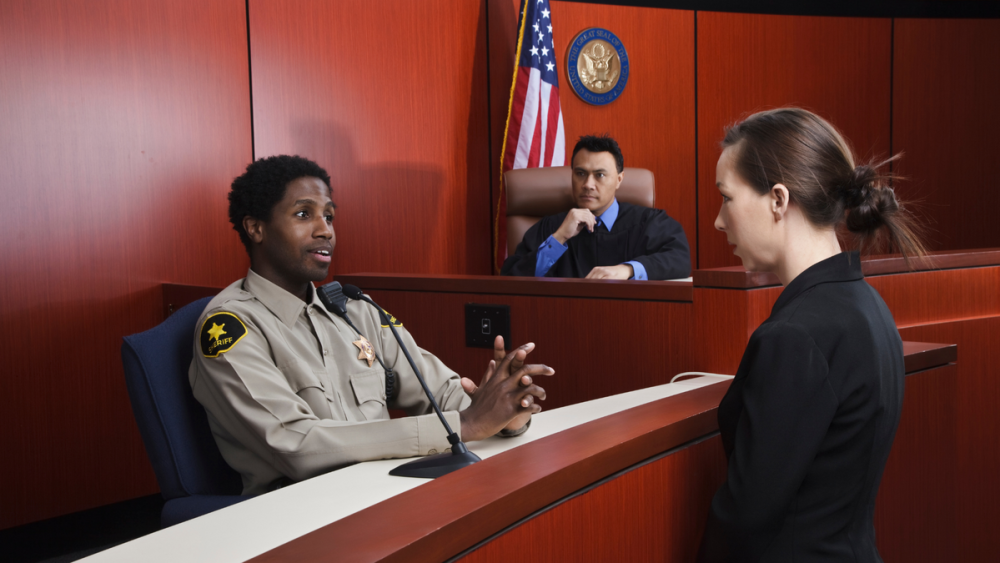Direct examination is where the trial is won or lost. For the prosecution to win, officers must answer questions credibly and persuasively to communicate the prosecution’s position to the jury. If officers do their job, the odds of winning the case may increase significantly.
Preparation is key
“Failing to prepare is preparing to fail.” — Benjamin Franklin
Law enforcement officers work long hours on investigations. When a case they worked on goes to trial, they want to win. Yet officers are rarely given adequate guidance on how they should prepare to testify.
Most officers assume that all they need to do is show up and answer questions. This misconception can be costly. How you prepare for direct examination is critical to your success as a witness. You are the one giving the answers, not the lawyer, so take responsibility for your own preparation. The standard advice to read your report and tell the truth is insufficient. While you must do those things, truly effective police testimony requires better tools.
Know why you are called
The time to start preparing your direct testimony is when you get your subpoena. This could be months after you wrote your report and closed the case. Start by asking yourself, “Why am I being called as a witness?” Most officers cannot answer this simple question correctly. Writing a report or responding to the scene is not a legally sufficient reason to call you as a witness. The correct answer is this: you are being called to give legally significant facts. These are facts that relate to an element of the crime. They tend to prove or disprove a fact critical to the case. For example, in an armed robbery, a weapon is an element of the crime. It is critical that the prosecution prove there was a weapon. If you recovered the weapon, then this is a legally significant fact and that is why you are being called as a witness. Knowing what evidence you are being called to give can help you prepare answers that emphasize those facts.
How much information
A compelling testimony depends on how much information you offer during direct examination. I have questioned hundreds of officers over the years, and I can tell you, officers tend to answer questions in one of two ways: too little information or too much information.
Too little information often results when prosecutors tell officers to only answer the question they are asked. For example, if asked, “Where were you at 2 a.m. on the date in question?” the answer is often “at work.” And when asked the follow-up question, “What were you doing?” the answer is usually “working.” These short, one-word answers are not conversational and certainly are not compelling.
Too much information may occur when officers try to be too conversational. In this case, the officer may ramble, go off track and offer irrelevant information. Neither of these answers is effective. Remember, your goal is to give a detailed, compelling narrative focused on the legally significant evidence you were called to present.
The three-fact method
The best way to give compelling and effective answers during direct examination is to use something I call “the three-fact method.” Three related facts are just enough, but not too much, information for jurors to process at one time. For example, when asked, “Where you at 2 a.m. on the day in question?” respond by saying, “I was assigned to the robbery task force, patrolling the alley behind First Avenue businesses and I found a gun in the dumpster.” You do not need to wait for the prosecutor to ask for each of these facts separately. Answers that give three facts are much more effective in telling the story. If needed, the prosecutor can then follow up with additional questions to emphasize the evidence needed to win the case.
Prepare for open-ended questions
Understand that the kinds of questions lawyers ask on direct examination versus cross-examination are very different. On direct examination, the prosecutor will ask open-ended questions: who, what, when, where, and why. These questions allow you to give more information and be more conversational than during cross-examination when defense lawyers ask yes or no questions. [1] Telling a compelling story on direct examination by offering multiple facts is essential to giving the jury the evidence needed to vote for a conviction.
Your answers are evidence
The judge will tell the jury to only consider evidence that comes from the witness stand. The jury will therefore be considering your answers in their deliberation – not the lawyer’s questions. As you prepare for direct examination, think about how you can recreate the reality of what you saw and did during the event in question. You will be giving critical firsthand information. Both lawyers will do their best to craft persuasive closing arguments but remember they can only use the evidence given by witnesses.
Vocabulary
Finally, consider your word choice during direct examination. Stay away from law enforcement shorthand and explain technical terms that jurors may not understand. Be professional and choose your words carefully. Avoid hesitation phrases like “probably”, “I think”, or “I believe.” These types of phrases open the door to reasonable doubt. The prosecution must prove their case beyond a reasonable doubt, so build the story slowly and clearly. The jurors and the lawyers were not there. You were. It is your job as a witness to relate what you saw and did in a way that is both detailed and comprehendible to the jurors. Prosecutors are depending on you to convincingly tell jurors the facts they need to convict the defendant.
In closing
It is part of your job to be a credible, persuasive witness. It may not be your favorite part of the job, but it is one of the most important. Prosecutors cannot win cases without effective testimony from the officers who were there. Put in the time and effort to prepare and you will give winning answers on direct examination.



